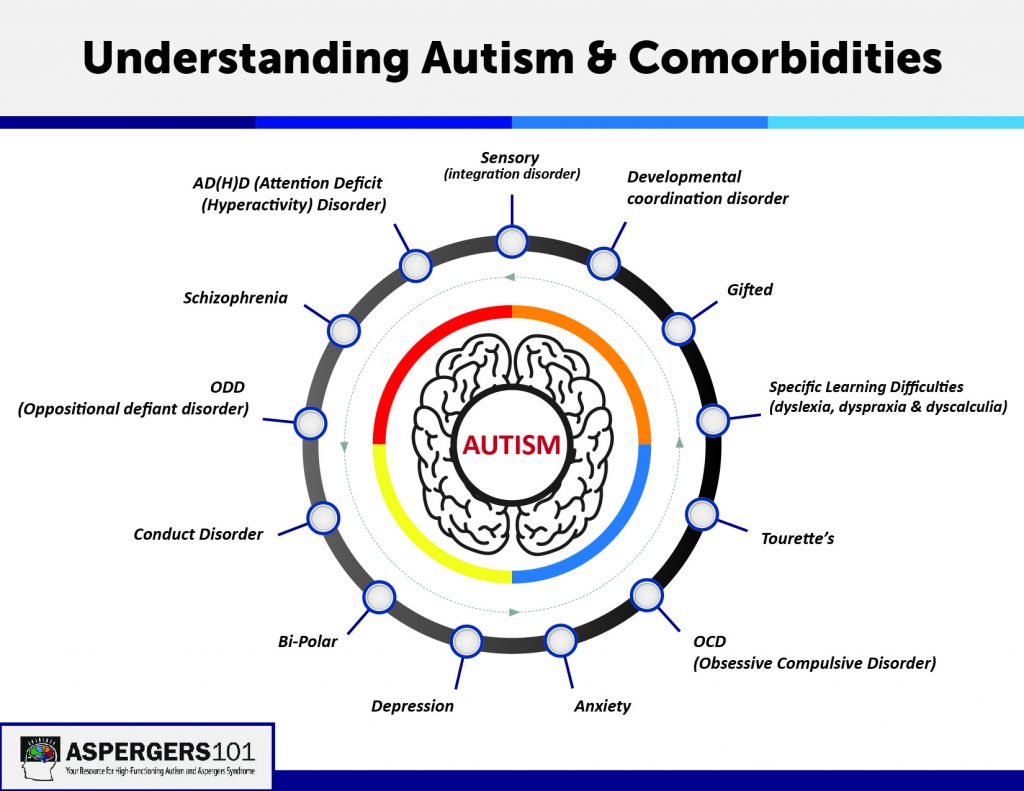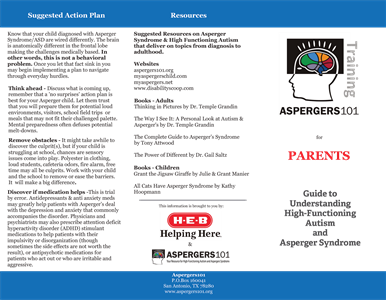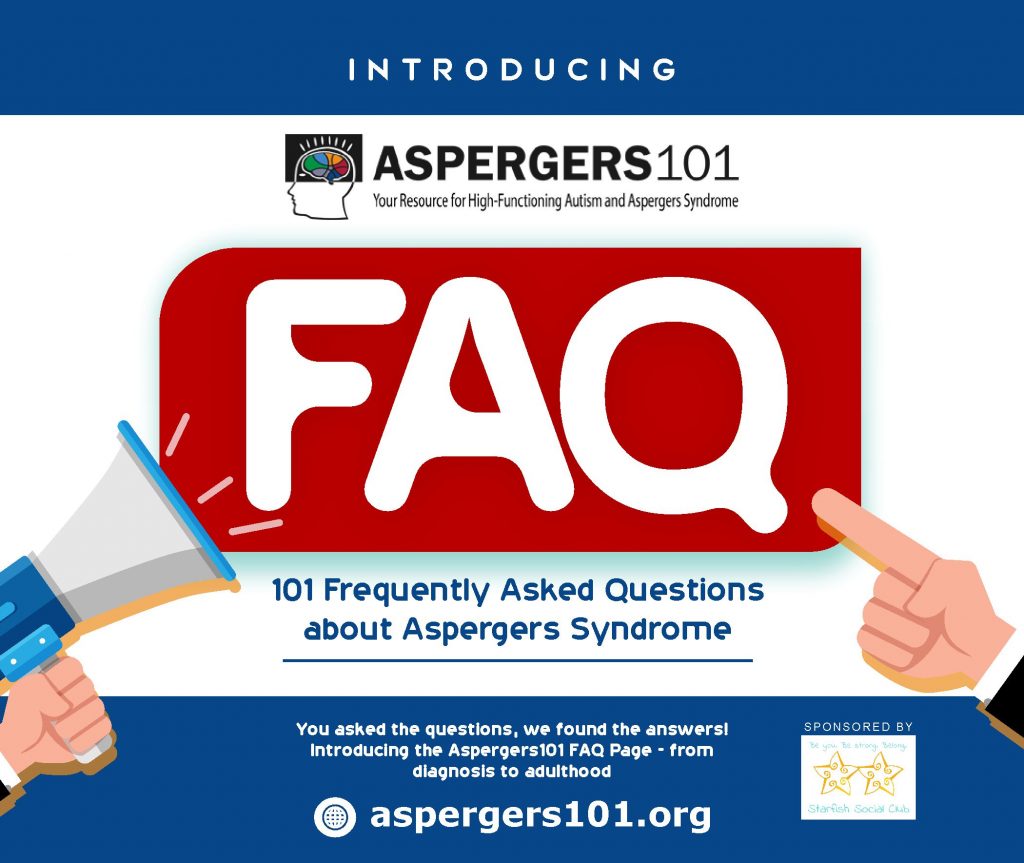Aspergers101 Training for Parents
Download Your Free Guide About Asperger Syndrome

When suspecting Autism or Asperger Syndrome, a parent experiences a range of emotions. Often the shock of the diagnosis quickly gives way to a thiristing curiosity of your child’s unique brain function. Your communication depends upon that knowledge. Aspergers101 Training for Parents just published a brochure specifically for that time when a basic understanding of Asperger Syndrome is essential not only for the understanding of the caregiver, but for relatives, neighbors and educators as well. We are pleased to offer you the tri-fold brochure as a downloadable (at the end of this blog) or to request multiples for your school or organization as a gift from Aspergers101 and H-E-B!
Key Characteristics of High Functioning Autism/Asperger Syndrome are:
- Difficulty with Communication
- Special Interests
- Love of Routine
- Poor Concentration/Easily Distracted
- Difficulty with Social Relationships
What is Asperger Syndrome?
Asperger Syndrome is a neurological condition resulting in a group of social and behavioral symptoms. It is part of a category of conditions called Autism Spectrum Disorders, though the revised DSM-V leaves Asperger Syndrome out of it’s manuel and places the symptoms under Autism Spectrum Disorder(s) or pervasive developmental disorder not otherwise specified,” or PDD-NOS.
The name, Asperger Syndrome is still used among the community as there has not otherwise been a name to specifically fit the diagnosis. Children with Asperger Syndrome usually have normal to above normal intelligence and do not have the language problems typical of autism. It can lead to difficulty interacting socially, repeat behaviors, and clumsiness.
What are the Challenges?
It is oftentimes stated that it isn’t the Autism or Asperger Syndrome that poses the greatest challenge. It is the comorbidities that often accompany ASD that is the biggest hurdle and must be treated.
A person diagnosed with Aspergers might inherit one, two or possibly more of these challenges as they age. Below lists many (but not all) of common comorbidities.

• Gastrointestinal disorders
• Sensory problems
• Seizures and epilepsy
• Intellectual disability
• Fragile X syndrome
• ADHD
• Bipolar disorder
• Obsessive compulsive disorder
• Tourette syndrome
• General anxiety
• Tuberous sclerosis
• Clinical depression
• Visual problems
Treatment(s)
Treatment of comorbid medical conditions may result in a substantial improvement of quality of life both of the child and their parents. It is imperative to first diagnose the comorbidity then get a customized treatment plan. Talk with a health professional like your child’s GP, nurse or pediatrician.
Know that your child diagnosed with Asperger Syndrome/ASD is wired differently. The brain is anatomically different in the frontal lobe making the challenges medically based. In other words, this is not a behavioral problem. Once you let that fact sink in you may begin implementing a plan to navigate through everyday hurdles.
-Jennifer Allen/Founder Aspergers101
Suggested Action Plan
Think ahead – Discuss what is coming up, remember that a ‘no surprises’ action plan is best for your Asperger child. Let them trust that you will prepare them for potential loud environments, visitors, school field trips or meals that may not fit their challenged palette. Mental preparedness often defuses potential melt-downs.
Remove obstacles – It might take awhile to discover the culprit(s), but if your child is struggling at school, chances are sensory issues come into play. Polyester in clothing, loud students, cafeteria odors, fire alarm, free time may all be culprits. Work with your child and the school to remove or ease the barriers. It will make a big difference.
Discover if medication helps –This is trial by error. Antidepressants & anti anxiety meds may greatly help patients with Asperger’s deal with the depression and anxiety that commonly accompanies the disorder. Physicians and psychiatrists may also prescribe attention deficit hyperactivity disorder (ADHD) stimulant medications to help patients with their impulsivity or disorganization (though sometimes the side effects are not worth the result), or antipsychotic medications for patients who act out or who are irritable and aggressive.
FAQ
How is Asperger Syndrome Diagnosed?
Diagnosis is typically between the ages of four and eleven. A comprehensive assessment involves a multidisciplinary team that observes across multiple settings, and includes neurological and genetic assessment as well as tests for cognition, psychomotor function, verbal and nonverbal strengths and weaknesses, style of learning, and skills for independent living.
How is Asperger Syndrome treated?
·Parent Education & Training
·Social Skills Training & Speech-Language Therapy
·Cognitive Behavior Therapy
.Medication
·Applied Behavioral Analysis (ABA)
·Sensory Integration/Occupational Therapy
What medicines typically help curb anxiety and depression?
*Selective serotonin reuptake inhibitors (SSRIs)
*Antipsychotic drugs
*Stimulant medicines
Alongside deficiencies, what are some positive traits?
*Ability to focus intensely for long periods
*Enhanced learning ability
*Deep knowledge of an obscure or difficult subject resulting in success scholastically and professionally when channeled.
*Honest & hard workers who make for excellent employees when painstaking & methodical analysis are required.
Free Downloadable Brochure
Please feel free to download the Aspergers101 Training for Parents Tri-Fold brochure here. If you are a school or a Autism-related non-profit, you may request these full color brochures for hand-out(s). This generous opportunity has been provided by the H-E-B Helping Here Community Involvement Department! Request form is just below the brochure.


To Request Brochures:
Brochures are provided in groups of 50, 100, 150, 200 or 250 to schools or non-profit organizations who would like to provide parents with basic information on High-Functioning Autism and Asperger Syndrome. Please fill out the requested information below and we will be in touch soon!

Two other excellent resources for basic training on Asperger Syndrome are:

A graduate of Abilene Christian University, Jennifer had a long career in TV Broadcasting. Upon learning her oldest son Sam had a form of Autism called Asperger’s Syndrome, she left her career and became a full-time mother to both of her sons. Jennifer elicited the participation of her family and together they produced several independent programs including a children’s animated series titled Ameriquest Kids, as well as a documentary and book titled, Coping to Excelling: Solutions for School-age Children Diagnosed with High-Functioning Autism or Aspergers Syndrome. She formed the nonprofit Asperger101 to provide on-going free resources related to ASD at Aspergers101.com and has implemented the Texas Driving with Disability Program and continues to grow the statewide initiative today. She and her husband have recently retired to their property in the Texas Hill Country.


